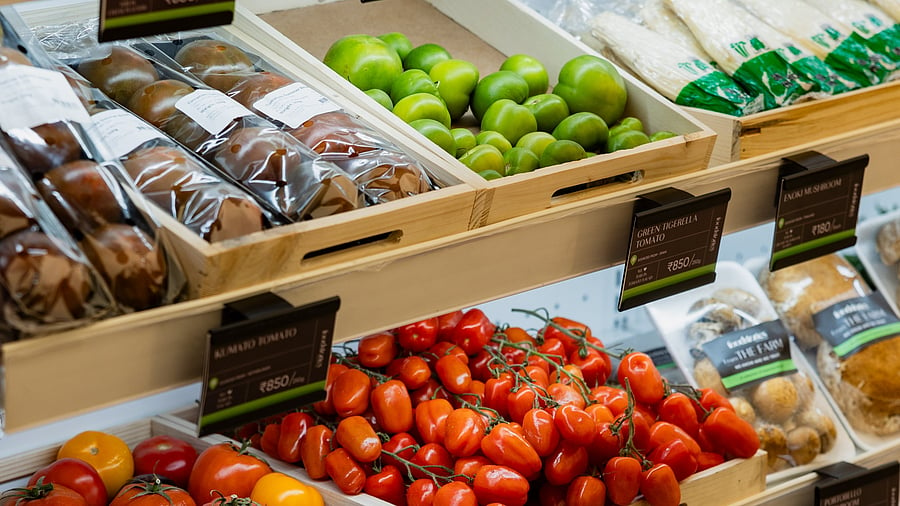
Credit: Special Arrangement
With the number of upscale supermarkets growing in Bengaluru, a wider variety of exotic fruits and vegetables is now regularly available. From Spain’s heirloom tomatoes to Thailand’s tender coconuts, the demand for imported produce has grown steadily despite their prices being way steeper than those of home-grown varieties, say industry insiders.
An in-house study by Simpli Namdhari’s found that 35% of its customers in Bengaluru gravitate toward exotic fruits and vegetables. The city’s cosmopolitan crowd is health-conscious and open to diverse culinary experiences, reasons Hema L, head of marketing at the pan-India grocery chain.
Blueberries from Peru, Morocco and Chile, avocados from Tanzania, and kiwis from New Zealand are among their customer favourites. “Imported items like blueberries and avocados are priced slightly higher than local produce due to transportation and import duties. Exotic fruits range from Rs 200 to Rs 600 per kilogram, depending on the product and seasonality,” says Hema. They also stock Murcott oranges from South Africa and China, apples from the USA and New Zealand, and dragon fruit from Vietnam.
Nature’s Basket, another supermarket chain, sells imported produce worth about Rs 15–20 lakh weekly in Bengaluru. Dragon fruit from Vietnam, avocados from Africa, New Zealand, and Australia, and blueberries from Peru, Chile, and the USA are popular. Vegetables like purple, orange and violet sweet potatoes, and celery are also sought after. “These are imported from Spain, France, and other parts of Europe,” says its COO Sachin Agarwal.
Fresh Fruits on Brigade Road has sold imported fruits for nearly 50 years. When it comes to Indian fruits, they focus on mangoes. Apart from that, their customers prefer imported fruits, with guavas and pineapples from Thailand and Medjool dates from Saudi Arabia being popular, shares a spokesperson. They also sell rambutans from Thailand (Rs 680 for 500 gm) and crimson grapes from the EU (Rs 2,480 per kg).
Sourcing process
Foodstories, a new supermarket on Lavelle Road, stocks around 10 tomato varieties, including five heirloom types — yellow pear, red pear, tigerella, red cherry, and yellow cherry. Other varieties include big boy, big beef and kumato. “These are imported from Spain and the Netherlands and are popular among gourmet chefs in the city,” shares Abhinav Gangumalla, farmer in residence. Heirloom tomatoes are priced at Rs 3,400 per kg.
The store also brings in Hass avocados from Mexico, and chillies such as jalapeno, habanero, bird’s eye, and red rawit from Spain and the Netherlands. Blackberries and raspberries come from the Netherlands. Tropical fruits like mangosteen and tender coconut from Thailand are also in demand.
Foodstories has global partner farms. “We only import fruits that are in season in the country of origin. The process of bringing it to India is an end-to-end cold chain and takes about a week,” explains Gangumalla.
Vishal Narayanaswamy, co-founder of Gourmet Garden, works with a private importer. “In the last three years, demand for imported fruits like blueberries and kiwi has increased. But customers haven’t shown much interest in imported vegetables. Instead, they ask for Indian produce like certain soppus from Andhra Pradesh and mustard greens from north India,” he adds.
Several farms in Karnataka have now begun cultivating exotic varieties like Hass avocados and red globe grapes, he adds.
‘BETTER TO EAT LOCAL’
According to clinical dietitian Dr Priyanka Singh, while it’s nice to try imported fruits and vegetables occasionally, they shouldn’t become part of a daily diet. “It’s always good to eat local. Geography and climate
decide what suits a population best. Even though blueberries are high in antioxidants, someone in Bengaluru
may not receive its full benefits due to travel time and preservatives involved. Look for local produce with similar benefits,” she explains.